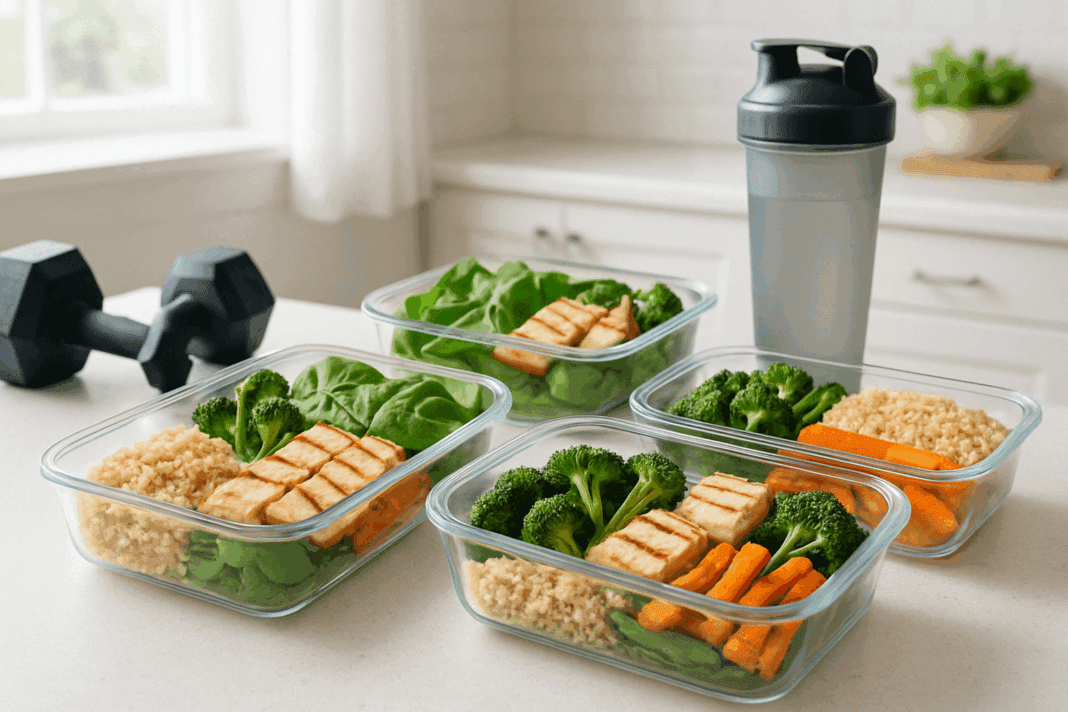In today’s results-driven fitness culture, what you put on your plate can matter as much as what you lift in the gym. For individuals looking to build lean muscle mass, maximize energy, and stay consistent with their performance goals, the best meal prep for muscle gain offers both structure and nutritional precision. This isn’t about following a fad or jumping on the latest TikTok trend. It’s about building a sustainable, evidence-based routine around food that fuels your body’s needs before, during, and after training. Whether you’re designing your own gym meals or exploring the benefits of training meal prep, every bite counts—and the science backs it up.
You may also like: Smart Meal Prep for Weight Loss: Expert-Approved Lunch Ideas and Recipes to Stay on Track
Meal prep fitness strategies are far more than a convenience tactic; they are rooted in the physiology of muscle repair, glycogen replenishment, and metabolic efficiency. By leveraging healthy recipes for muscle gain that emphasize whole, nutrient-dense foods, you position yourself for better performance, faster recovery, and long-term sustainability. As we delve into the essentials of workout meal prep, we’ll also unpack how popular diets like keto intersect with fitness goals, especially in light of the ongoing debate around the ketogenic diet vs low carb plans.
Understanding the Science of Muscle Gain and Nutrition
Gaining lean muscle mass requires a combination of progressive resistance training and targeted nutritional support. Macronutrients play a critical role in this equation. Protein is the most discussed player due to its essential role in muscle protein synthesis, but carbohydrates and fats also contribute significantly to energy availability and hormonal balance. For effective gym meals, this triad must be strategically balanced.
Protein provides the amino acids necessary for repairing and building muscle tissue, especially after resistance training. However, without sufficient carbohydrates, those proteins may be diverted for energy, rather than muscle development. Carbs replenish glycogen stores, fuel workouts, and prevent the body from tapping into muscle tissue for fuel. Healthy fats, meanwhile, support hormonal health—including testosterone levels—which are crucial for muscle growth and recovery.
This is where intelligent training meal prep makes all the difference. Rather than scrambling for post-workout fuel or relying on processed convenience foods, having pre-prepared, nutrient-optimized meals allows athletes to consistently meet their nutritional needs without guesswork or time pressure. In the context of the ongoing discussion around the low carb diet keto diet trend, it’s important to understand that ultra-low-carb approaches may compromise high-intensity performance and muscle maintenance if not carefully managed.
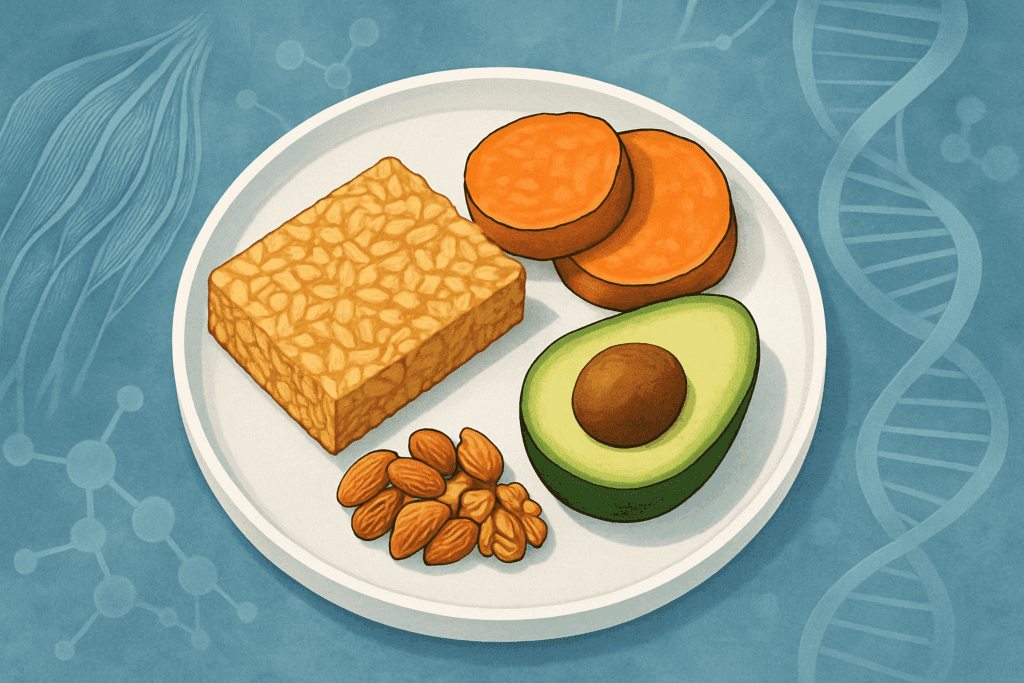
Why Consistent Meal Prep Boosts Results and Recovery
Consistency is king in any fitness plan. Training intensity and recovery are tightly linked to dietary habits, and this is where structured meal prep fitness protocols shine. The body requires regular infusions of energy and amino acids to rebuild muscle tissue after the microtears induced by strength training. Failing to meet caloric or protein needs consistently can lead to stagnation, fatigue, or even muscle loss.
Meal prep lean eating strategies take the guesswork out of daily decisions. Pre-portioning your meals ensures that you’re hitting your macros and calorie targets, day in and day out. For individuals pursuing hypertrophy (muscle growth), the benefits are especially pronounced. By integrating healthy recipes for muscle gain into a rotating weekly menu, athletes avoid the nutritional boredom that often derails progress.
Additionally, structured gym meals reduce the reliance on impulse eating or nutrient-poor fast food. This can be particularly important for those experimenting with diet plans like the ketogenic diet vs low carb alternatives. While both promise fat adaptation and potential weight loss, they differ significantly in their impact on performance and muscle retention—a topic we’ll explore in greater depth.
Healthy Recipes for Muscle Gain: What to Prioritize
The best meal prep for muscle gain begins with nutrient quality. Whole, minimally processed ingredients should serve as the foundation of every meal. High-quality protein sources include lentils, tofu, tempeh, legumes, edamame, and quinoa—especially in plant-forward diets. Pairing these with complex carbohydrates like sweet potatoes, brown rice, and oats enhances glycogen replenishment.
Vegetables rich in micronutrients support immune function and cellular repair. Dark leafy greens, bell peppers, cruciferous vegetables, and colorful produce supply antioxidants and phytochemicals that aid recovery. For those aiming to stay lean while adding muscle, incorporating healthy fats from avocados, chia seeds, nuts, and olive oil into meal prep lean strategies supports satiety and hormonal health.
Plant-based or not, portioning and meal timing matter. Post-workout meals should ideally be consumed within 30-60 minutes after training. This window optimizes muscle protein synthesis and glycogen repletion. For those following meal prep fitness routines, preparing easily digestible post-workout meals ahead of time ensures you never miss this crucial opportunity.
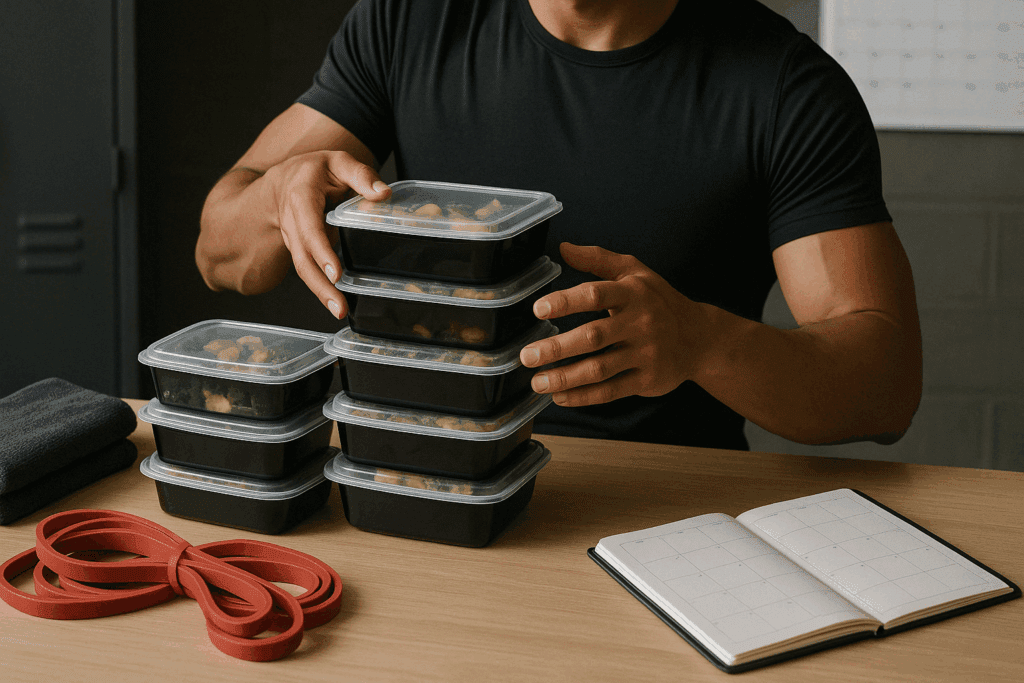
How Keto and Low-Carb Diets Affect Muscle Building
The debate around the ketogenic diet vs low carb diets is particularly relevant for fitness enthusiasts. While both restrict carbohydrates, they differ in degree and metabolic impact. A keto diet typically limits carbs to under 50 grams per day, encouraging the body to enter ketosis—a state where fat becomes the primary fuel source. In contrast, a low carb diet may allow 100-150 grams of carbs, depending on activity level.
For endurance or strength athletes, the question often becomes: is keto a low carb diet that supports muscle gain? The answer is nuanced. In the short term, individuals may experience a dip in training performance as glycogen stores deplete. Long term, some athletes adapt successfully, but research suggests that very low carb intakes may impair anaerobic performance and reduce lean mass accrual.
Is keto a good diet for muscle gain? That depends on your training style, body composition goals, and ability to maintain adequate protein intake. While fat can fuel lower-intensity sessions, high-intensity strength training typically benefits from greater carbohydrate availability. Therefore, for those serious about hypertrophy, low carb plans with moderate carb allowances may offer more balance. The key lies in understanding the difference in the low carb diet keto diet continuum—and tailoring your nutrition to your specific needs.
Smart Strategies for Building a Meal Prep Routine
To create an effective meal prep fitness plan, begin by calculating your macronutrient targets based on body weight, activity level, and goals. Use a registered dietitian or reputable online calculator to estimate your needs. Once you have your macro targets, build meals around lean proteins, complex carbs, and healthy fats.
Batch cooking is the cornerstone of successful training meal prep. Choose one or two days each week to prepare multiple meals in advance. Invest in high-quality freezer-safe meal prep containers to portion and store your meals. This ensures freshness and convenience throughout the week.
Rotate recipes every few weeks to maintain variety and prevent taste fatigue. Try combinations like tempeh stir-fry with brown rice, chickpea and quinoa bowls, or tofu curry with vegetables and lentils. These meals provide complete protein, fiber, and essential vitamins and minerals. Importantly, they support lean muscle gain without excessive saturated fat or processed ingredients.
Incorporate snacks strategically. Pre-portioned options like protein smoothies, roasted chickpeas, or peanut butter energy bites can support muscle maintenance between meals. For those adhering to stricter carb limits, these can be tailored to suit a keto or low-carb lifestyle—as long as you understand the nuance behind is keto no carbs versus low carb moderation.
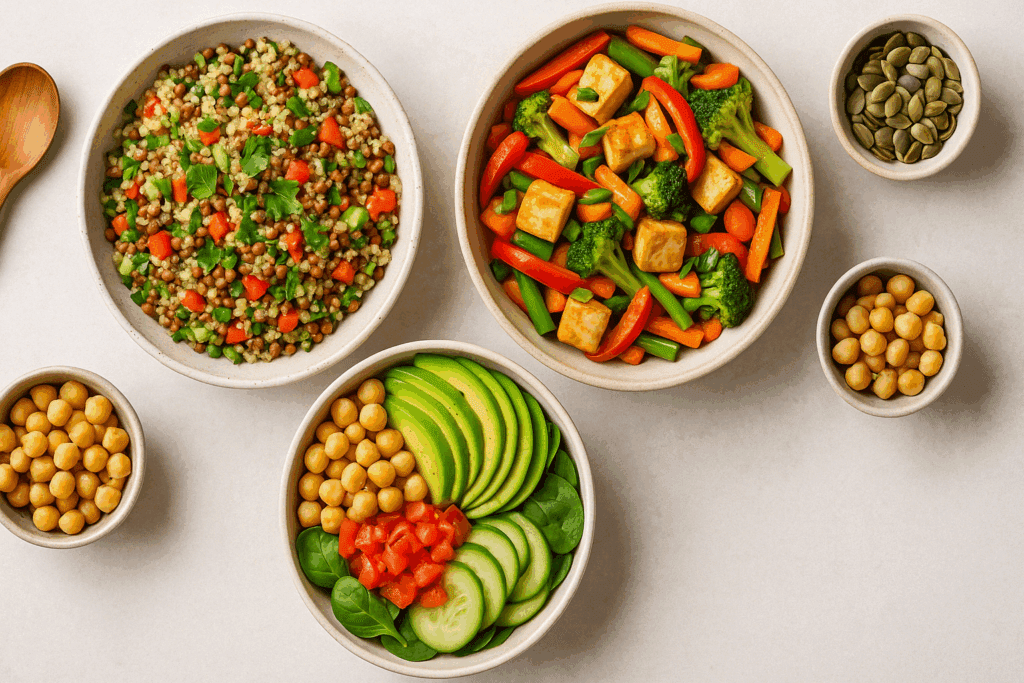
Nutrient Timing and the Role of Gym Meals
The timing of your meals can have a significant impact on performance and recovery. Gym meals, especially those consumed pre- and post-workout, should focus on fast-digesting carbohydrates and high-quality protein. Before a workout, aim for a small meal rich in carbs and moderate in protein to provide energy without sluggishness. A banana with peanut butter or a tofu wrap with some fruit are excellent choices.
After a workout, your body is primed to absorb nutrients. Consuming a balanced meal of protein and carbs within an hour enhances muscle protein synthesis and kickstarts the recovery process. This is where structured workout meal prep excels, ensuring that nutrient timing becomes an intentional, not accidental, part of your fitness regimen.
When comparing ketogenic diet vs low carb post-workout strategies, timing becomes even more crucial. Low-carb athletes may benefit from consuming slightly more carbs around training windows to maximize performance and muscle repair while still staying within daily carb limits. This dynamic approach helps answer the question: is keto a good diet when muscle retention and training capacity are priorities?
Avoiding Common Pitfalls in Meal Prep Fitness Plans
Despite the best intentions, many fitness-minded individuals stumble when implementing meal prep lean routines. One common error is underestimating total caloric needs. Muscle building is a metabolically expensive process. Undereating, even while hitting protein goals, can hinder results and lead to frustration. Always monitor your energy levels, recovery, and progress to ensure you’re fueling adequately.
Another misstep is relying too heavily on processed protein products. While convenient, excessive protein bars or shakes can displace whole foods that offer vital nutrients. Focus on real food sources whenever possible, reserving supplements for convenience rather than daily dependence.
Lastly, failing to adjust your approach can derail progress. Your nutritional needs will evolve as your training volume, intensity, and body composition change. Periodically reassess your meal prep fitness strategy to ensure it still aligns with your goals. And if you’re experimenting with low-carb eating, remember to continually evaluate whether the approach feels sustainable. Ask yourself: is a keto diet sustainable for me long-term? Am I thriving, or merely surviving?

Sustainability and Lifestyle Integration
True health and performance come from habits you can maintain. Meal prep for muscle gain must fit into your real life. This means choosing meals you enjoy, establishing a prep routine that fits your schedule, and allowing for occasional flexibility. Fitness is a lifelong journey, and rigid, joyless eating patterns often lead to burnout.
If you’re following a more restrictive dietary approach, like keto, consider how it fits into your lifestyle over time. Is keto no carbs, or are there ways to integrate nutrient-rich, moderate-carb meals while maintaining fat adaptation? Can you stick with it through travel, holidays, and busy workweeks? These questions help determine whether your plan is sustainable.
For most people, a balanced, plant-forward diet that includes a variety of whole foods will yield both health and physique benefits without excessive restriction. Understanding the nuances of keto diet vs low carb diet frameworks allows you to adapt intelligently rather than follow dogmatically.
Building muscle isn’t just about protein shakes and heavy squats. It’s about showing up for your body with the right fuel, at the right time, in the right amounts—consistently. That consistency begins with meal prep fitness strategies that nourish you from the inside out.
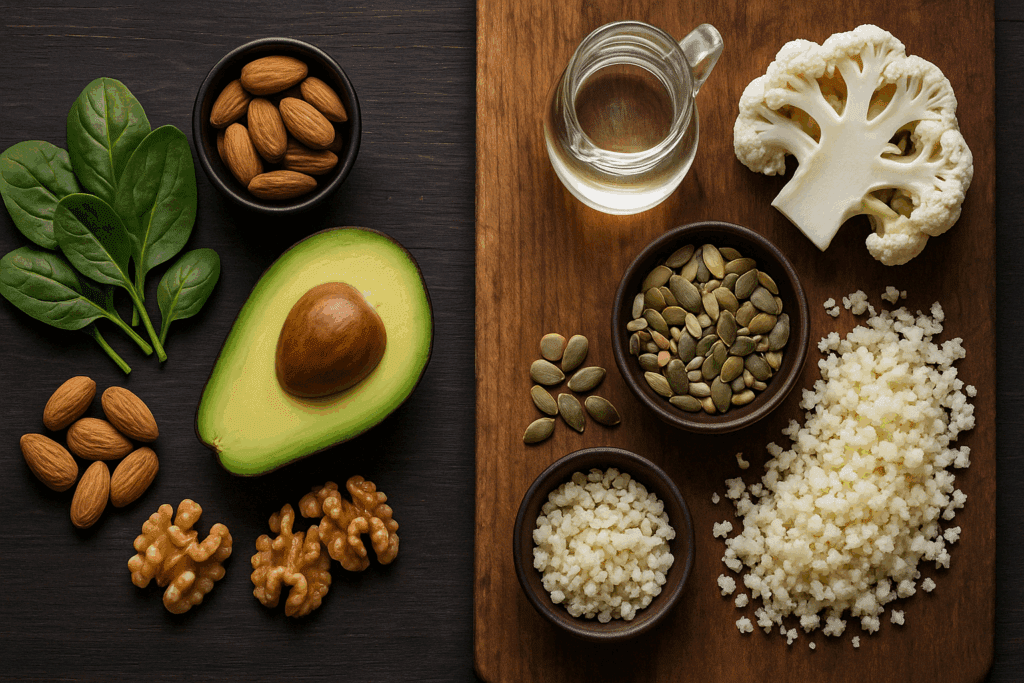
Frequently Asked Questions: Fueling Fitness with Smart Meal Prep
1. How can I make workout meal prep more efficient without sacrificing nutrition?
One of the best ways to streamline workout meal prep while keeping meals nutritionally dense is by adopting a modular approach. Prepare a set of versatile components—like roasted vegetables, seasoned tofu or tempeh, quinoa, and a healthy sauce—that can be mixed and matched throughout the week. This method reduces prep fatigue while ensuring meal diversity. To support consistent muscle gain, store high-protein elements in larger batches and vary the spices to create different cultural profiles (such as Mediterranean, Asian, or Latin-inspired gym meals). By building your meal prep fitness routine around interchangeable elements, you can save time, stay consistent, and prevent burnout from eating the same dishes daily.
2. What are some lesser-known but effective ingredients for healthy recipes for muscle gain?
Beyond standard protein sources, there are underrated ingredients that enhance the anabolic quality of meals. Seitan, made from wheat gluten, is one of the highest plant-based protein sources and works exceptionally well in training meal prep due to its versatility and texture. Nutritional yeast not only adds a cheesy flavor but also provides B-vitamins critical for energy metabolism. Sprouted grains and legumes digest more easily and may improve nutrient absorption—a useful upgrade for gym meals aimed at muscle recovery. Even spices like turmeric and ginger can play a supporting role in reducing post-workout inflammation. Including these elements into healthy recipes for muscle gain can elevate both flavor and functional value.
3. Can I maintain meal prep lean goals while eating out occasionally?
Yes, staying committed to your meal prep lean objectives while dining out is possible with mindful planning. Choose restaurants with customizable options, such as build-your-own bowls or salad bars, where you can select lean proteins, complex carbs, and healthy fats. Before going out, check the menu online to identify choices aligned with your training meal prep strategy. Bringing a protein-packed side dish, like a chickpea salad or a protein smoothie, can complement lighter restaurant options and prevent overeating. Treat restaurant visits as strategic supplements to your gym meals plan rather than obstacles, and you can stay consistent without feeling restricted.
4. How does mental health influence consistency with meal prep fitness habits?
Mental well-being plays a pivotal role in sustaining long-term meal prep fitness routines. Chronic stress can affect appetite regulation, food choices, and motivation to prepare nutritious meals. Building a self-compassionate mindset—rather than rigid self-discipline—helps reduce guilt and allows for flexible adaptation when life disrupts your schedule. Consider meal prep as a self-care practice that supports both physical and emotional resilience. Even incorporating mindfulness during the cooking process or keeping a gratitude journal for your progress can improve adherence to your best meal prep for muscle gain strategy.
5. Are there emerging technologies or tools that make training meal prep easier?
Absolutely. The rise of smart kitchen appliances and digital nutrition trackers has transformed how we approach training meal prep. Multi-cookers like Instant Pots or air fryers reduce cooking time significantly and retain more nutrients compared to traditional methods. AI-powered apps can now suggest personalized gym meals based on biometric data and even generate shopping lists. Vacuum sealers and meal prep automation kits help extend freshness and portion precision. These innovations not only save time but also optimize consistency, which is crucial for the best meal prep for muscle gain outcomes.
6. What are some signs that I need to adjust my current gym meals routine?
If you’re consistently feeling sluggish, experiencing digestive issues, or not progressing toward your physique goals, your gym meals may require an update. Plateauing in muscle gain or noticing decreased workout performance are also red flags. Meal monotony is another common issue—psychological satiety matters as much as nutritional sufficiency. Additionally, seasonal changes or shifts in your training intensity should prompt a review of your meal prep fitness protocol. Listening to your body’s feedback is essential; sustainable muscle gain requires continuous alignment between food, training, and recovery.
7. How can I design gym meals to support both muscle gain and hormonal balance?
Hormonal health is often overlooked in the context of workout meal prep. Including healthy fats from sources like flaxseeds, walnuts, and avocados supports the production of testosterone and other anabolic hormones. Cruciferous vegetables such as broccoli and kale aid in estrogen metabolism, which may help maintain a favorable muscle-building environment. Zinc-rich foods like lentils and pumpkin seeds also support endocrine function. When building healthy recipes for muscle gain, think beyond macros and include micronutrients that support long-term physiological balance. This holistic approach makes your training meal prep not only effective but foundational for overall well-being.
8. What cultural considerations can enhance the diversity of my meal prep lean plan?
Exploring global cuisines adds both nutritional variety and psychological satisfaction to your meal prep lean strategy. For example, Middle Eastern dishes often combine legumes, herbs, and olive oil—ideal for balanced gym meals. Asian-inspired bowls with tempeh, fermented vegetables, and brown rice offer a probiotic boost alongside complex carbs and plant protein. Latin American staples like black beans, plantains, and quinoa provide excellent nutrient density and flavor diversity. Embracing multicultural inspirations within your workout meal prep not only keeps taste fatigue at bay but also introduces diverse phytochemicals and cooking techniques that can elevate your health.
9. How can I scale my best meal prep for muscle gain routine for a family or partner?
Meal prep often becomes more sustainable when shared. To align your best meal prep for muscle gain plan with family needs, start with versatile base meals that can be modified for individual preferences. For example, prepare a large batch of lentil stew that you can pair with whole grains, while a partner might prefer it over pasta. Involving loved ones in the cooking process can create a shared sense of purpose and improve adherence for everyone. Children or picky eaters may respond better when gym meals are presented in colorful, build-your-own formats like burrito bowls or wraps. By making training meal prep a communal effort, you build consistency and support across your household.
10. What are future trends in meal prep fitness that we should watch?
The future of meal prep fitness is likely to be shaped by personalization, sustainability, and data-driven choices. Expect to see more AI-integrated meal planning platforms that adapt in real time to fitness progress and biometric feedback. Plant-based protein innovation is also accelerating, with new whole food ingredients like duckweed and lupin beans making their way into gym meals. Packaging trends are shifting toward compostable, reusable containers that align with both convenience and environmental stewardship. Finally, functional meal kits tailored to workout recovery or immune support are gaining traction in the meal prep lean space. Staying ahead of these trends will empower you to maintain the best meal prep for muscle gain while aligning with evolving values and technologies.
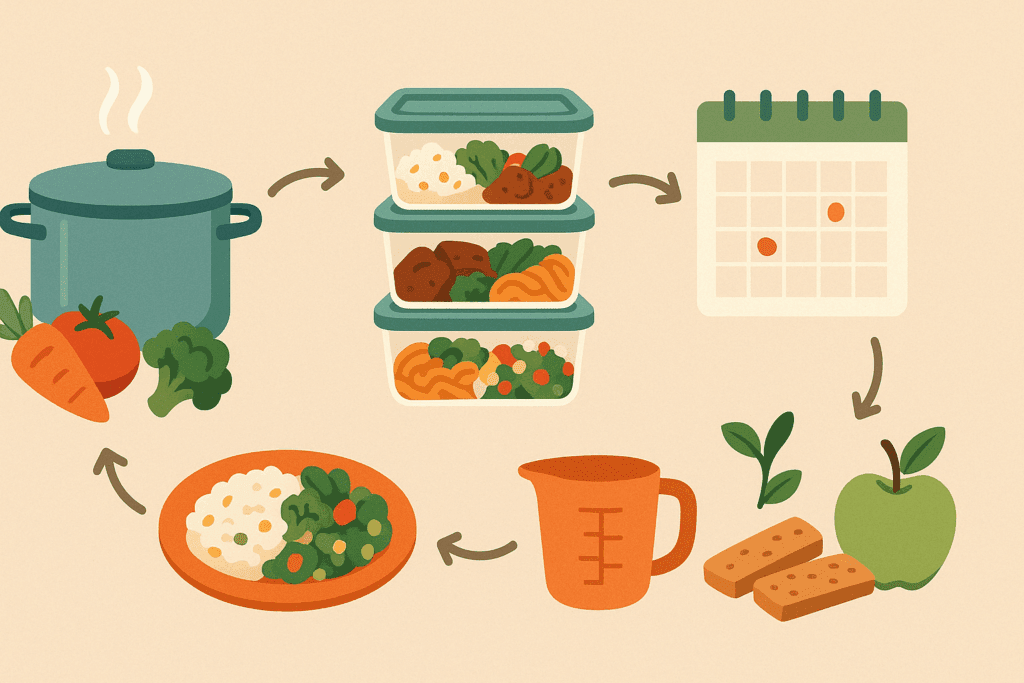
Fuel Your Progress: The Lasting Power of Intentional Meal Prep
In the pursuit of muscle gain, meal prep is more than just a productivity hack—it’s a powerful tool for aligning your nutrition with your physical ambitions. By adopting a structured approach to training meal prep, you eliminate nutritional guesswork, reduce stress, and give your body the resources it needs to thrive. Thoughtfully designed gym meals not only support recovery but also reinforce the discipline and self-respect that strength training cultivates.
Whether you’re navigating the complexities of the ketogenic diet vs low carb approaches or just trying to eat cleaner, smarter, and more intentionally, the principles remain the same: prioritize quality, plan ahead, and listen to your body’s feedback. If you ever find yourself asking, “Is keto a low carb diet that supports my fitness goals? Is a keto diet sustainable for my lifestyle?” the answer may depend less on the diet itself and more on how well your routine supports consistency, satisfaction, and sustainability.
Ultimately, the best meal prep for muscle gain is the one that honors your goals while being grounded in nutritional science. It’s about leveraging knowledge, discipline, and a dash of creativity to build a way of eating that fuels not just your workouts, but your life.
Was this article helpful? Don’t let it stop with you. Share it right now with someone who needs to see it—whether it’s a friend, a colleague, or your whole network. And if staying ahead on this topic matters to you, subscribe to this publication for the most up-to-date information. You’ll get the latest insights delivered straight to you—no searching, no missing out.
Further Reading:
26 Foods to Eat to Gain Muscle

